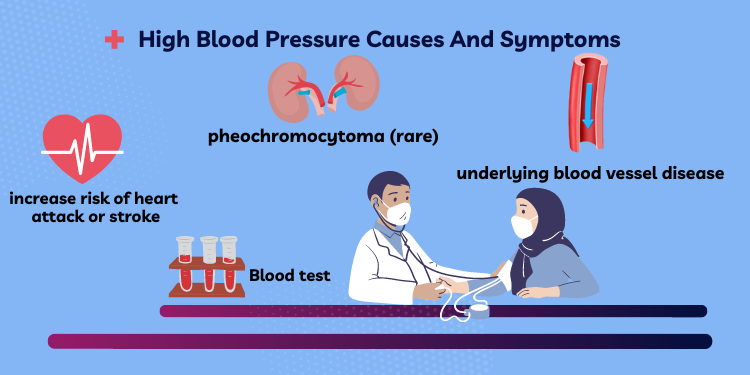Introduction
High blood pressure or hypertension is a common health condition, which affects the arteries and artery walls of your body. When you have high blood pressure, the blood force that pushes against the artery walls becomes consistently too high. In this situation, your heart forces you to work harder to pump out the blood. The main problem is that many people fail to know about hypertension issues. We will thus discuss a few aspects of hypertension and signs of high blood pressure, which you should never overlook.
Normal and High Blood Pressure Range
Normal blood pressure is measurable in systolic and diastolic blood pressure and their ideal readings are 120 mm Hg and 80 mm Hg respectively. Based on this, a person has high blood pressure if his/her reading becomes 130/80 mm Hg or higher than it.
Categories of High Blood Pressure
Cardiologists have categorized human blood pressure as follows-
Elevated Blood Pressure
If your systolic number ranges between 120 mm Hg and 129 mm Hg while the diastolic number remains within 80 mm Hg, you have elevated blood pressure.
Stage 1 Hypertension
Stage 1 hypertension has systolic blood pressure ranging from 130 mm Hg to 139 mm Hg, while that of diastolic pressure between 80 mm Hg and 89 mm Hg.
Stage 2 Hypertension
In Stage 2 hypertension, you have a systolic reading of 140 mm or higher and the diastolic reading of 90 mm Hg or higher than it.
Why You should not ignore hypertension
Anyone who has high blood pressure remains at risk of cardiac disease, stroke, heart attack, and other problems. Hence, you must go for regular blood pressure check-ups or keep track of high blood pressure symptoms.
Common Signs of High Blood Pressure
In most cases, people with elevated or stage 1 high blood pressure do not have any symptoms until the condition becomes severe. Elderly and people with family history of hypertension should thus consult their doctors for regular blood pressure checkups. Alternatively, you should check your pressure right at home. Simultaneously, you should be alert to look out for the following high blood pressure symptoms–
1. Bleeding from your nose
2. Severe headaches
3. Confusion or fatigue
4. Chest pain
5. Vision problems
6. Difficulty in breathing
7. Breathing shortness
8. Presence of blood in your urine (other than menstruation)
9. Irregular heartbeat
10. Seizures
11. Pounding in your ears, neck, or chest
A few people may have additional signs of high blood pressure. These include nervousness, dizziness, sweating, blood spot in their eyes, facial flushing, and difficulty sleeping. Sometimes, women have high blood pressure during the second and last trimesters of their pregnancy period.
Causes of High Blood Pressure
Once you know a few common hypertension symptoms, you should also know the causes of high blood pressure to avoid other health issues in the future. The problem often occurs from the buildup of plaque in arteries. Doctors refer to this activity as atherosclerosis. Furthermore, hypertension may even cause suddenly from an underlying health condition or certain medicines. These include the following-
1. Problems in blood vessels right from birth, which also refers to congenital heart defects
2. Tumors in adrenal glands
3. Prescription drugs, like birth control pills, painkillers, and cough medicines
4. Kidney and liver problems
5. Type 1 or Type 2 diabetes
6. Obstructive form of sleep apnea
Hypothyroid or hyperthyroid problems
Risk Facts of High Blood Pressure
Other than causes of high blood pressure, the condition has many risk factors to check-
Age of a Person
The risk related to hypertension increases with the age of a person. Accordingly, the problem is more in men until they reach 64 years of age. In contrast, women are prone to develop high blood pressure after 65 years of age.
Family History
You may likely develop hypertension if any of your siblings, parents, or family members have the same condition. For this, you should also stay aware of high blood pressure treatment in advanced from your family’s cardiologist timely.
Overweight or Obesity
Excessive weight gain leads to changes in people’s blood vessels and other body parts. Such changes usually increase your blood pressure. Obesity also increases the risk related to high cholesterol levels and heart diseases.
Excessive Salt
Excessive salt or sodium intake in your body causes fluid retention followed by an increase in blood pressure.
Vaping, Chewing, or Smoking Tobacco
Tobacco chewing, smoking, or vaping immediately increases your blood pressure levels for a while. Besides, smoking tobacco injures the walls of your blood vessels and causes hardening of arteries faster. Both situations lead to the condition of hypertension. Hence, if you vape or smoke, ask your healthcare provider to develop strategies to quit smoking.
Elevated Levels of Stress
Elevated levels of stress are also a root cause of high blood pressure in humans. Before you should go for high blood pressure treatment or consultation, you should undergo therapies/techniques to avoid/manage stress levels.
Conclusion
High blood pressure or hypertension may come with or without underlying symptoms. Nevertheless, if you detect any hypertension symptom, you must consult your doctor and check-up your blood pressure immediately. Hypertension is controllable if you work smartly and identify the signs earlier to boost your heart health.



Discussion about this post